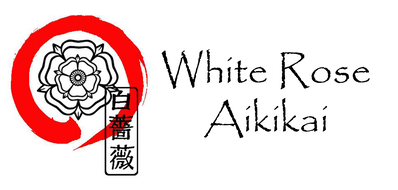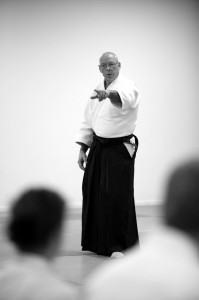The Importance of the Shodan Grading.
An Interview with Shane Riley Sensei.
Questions asked by Ashley Scholefield.
How well do you remember your own Shodan grading?
I remember it very well as if it were yesterday, even though it was over 30 years ago. I had to travel to Birmingham to attend a Yudansha course and grading, it was for 1st kyu and above. There was no-one else eligible in our dojo to attend the course, so I was on my own. A very daunting experience as I only knew a few of the other Yudansha that were present. I found the dojo, it was an old wooden scout hut surrounded by a high fence with barbed wire around the tops. It was like a scene out of Tenko. As I pulled up in my car, I was told to make sure my car was parked in the compound as it was a very rough area. As if I wasn’t already on edge!
The course and grading was conducted by a Sensei Les Hart, who was a senior instructor in Wales. He had practised both Aikido and Judo out in Japan. The tuition was very physical, as was the examination. I remember trying to dive into and under the legs of one of the candidates for San Dan in a randori prior to the exams, and he slid back and brought a shomen strike down on the back of my neck. I felt rather foolish and overawed as I was the only candidate for Shodan exam; the others were for Ni Dan and San Dan, and I was now feeling a little bit out of my depth.
When it was my turn for examination, I had to focus on the time and effort I had put in to get this far, and the people who were supporting and relying on me. I wasn’t going to let anyone down, so I got up and concentrated on being positive. I don’t know about being relaxed, but by golly I was positive! Nobody gave or asked for any favours. After what seemed like forever, I was sat down to await my fate. I must have done okay, as I was promoted to Shodan. And then the learning began!
Did you feel it came at the right time in your training?
I don’t think that you ever think it is the right time; you always wanted to be more prepared. But as I was the Sensei of the dojo at 2nd kyu, I was pushed along by the students and of course my own quest for knowledge. So I suppose it was.
How long after taking 1st kyu should a student start preparing for Shodan?
People tend to put too much emphasis on the ‘Black Belt’. It is a level of achievement yes! And it is the benchmark of the martial arts. But your practice should be to gain perfection (which we never achieve), not a coloured belt, be it black or yellow or whatever colour you so choose. So to concentrate on a specific grade is not what your practice should be about. Any promotion should be a natural progression of your day-to-day practice.
What does a student show during a Shodan grading at your dojo?
SPIRIT! Without spirit, there is no technique.
How should a student approach this grading both mentally and physically?
Even though it is a natural progression of the Aikido practice of the students, it is only human nature to put that bit extra in as no-one wants to be unsuccessful in taking the exam. Once a student has been invited to take the exam, it is common to see the student up their fitness training and perhaps an extra night per week of hard practice. The fitness level for an exam is different than for a normal class. It is relentless work, whereas in a class, you do get a breather whilst being taught, (unless used as uke). Also, the nerves start to drain your energy. This is why correct breathing is such a big part of your Aikido – it keeps you focused and gives you rhythm and harmony.
As mentioned previously, I will always look for calmness, good spirit, and correct form whilst under pressure. At the end of the day, it is a test and if the student is successful, then he/she represents my standards and those of the Association. We have always tried to set a good standard, and I will not compromise this; any student who comes before me for examination understands and accepts this.
Nerves will obviously come into play during a student’s test; do you see this as something they should begin to be overcoming at this level?
Yes, most definitely. A student should begin to focus themselves with their breathing and focusing on their centre. Nerves affect all of us, but it is how you control them that makes the individual. If you are in a situation, whether physically or mentally, controlling the way you feel is paramount. Our style of Aikido is very robust, so when students start to progress, they are put under pressure from the seniors so when a test comes along the student knows that they will be worked even harder, so they have to make a big effort to hide their nerves and make them work for them rather than be a hindrance. Nerves are not an excuse for a poor examination; they must be overcome. I think anyone who says they are not nervous at the start of a test is either having a grade given, or a jolly good liar! I had been in several confrontations doing security work prior to my Shodan grading, and felt pretty cool about pressure. But when I arrived at the dojo that day over 30 years ago, I was as nervous as the next student, but I controlled it.
What advice do you give to students beforehand, if at all?
I always have a word with candidates taking Yudansha gradings. I find it awkward when you are their teacher as well as examiner. So I tell them to relax and try to enjoy it. It isn’t the end of the world if they are not successful this time, but they wouldn’t be in front of me unless we thought they could be successful – it is up to them to prove we were right to put them forward for examination.
How long does the grading typically last?
On average, around 30 to 60 minutes. It isn’t a fitness test; it is a test of their Aikido ability and understanding. Of course, how the student has prepared is taken into account.
When I have been a guest at other Associations, I have seen students turn up with little preparation and they have run out of steam halfway through the exam.
Age is also an important factor – I would not keep a 60 year old grading for as long as a 20 year old. I would be looking for different Aikido from them at the two ages.
Is the pass rate high?
Because students are invited to take the exam when we feel they are ready, rather than just having a go, the pass rate is fairly good. It is not a foregone conclusion once they have been put forward that they will be successful. Very hard work is required to pass the test. Only last year we had two students taking Shodan. Both were very good prospects but the nerves got to them both, and they were unsuccessful. One of them re-graded three months later and was successful, and the other licked his wounds for a year before he began training again.
How many Shodan have you successfully passed?
Now that takes some thinking about. If you mean personally graded, or taught to Shodan, that is different. I think I have personally trained 99% of our Yudansha to Shodan. I have also 2 Rokudans, 6 Godan, and many Yondan that I have personally trained, so it doesn’t stop at Shodan – the journey should keep going for all of us. As for numbers then, over the years I must have trained to Shodan around sixty or more. The ones I have graded and that are still practising numbers around thirty.
Do you think some students place too much emphasis on reaching black belt and slack off a touch once passed?
I cannot comment on other Associations, but as I have said all along in our Association, it is a progression of their practice, not the end goal. It is stressed to the students once Shodan is attained that they then being to learn in earnest. The first few weeks after they have been successful, the student is worked hard as Sensei’s uke, and by the seniors (as a reward for being successful – laugh!). I have only ever had one student that attained Shodan and then quit. His wife said “right, now you have got your ruddy black belt, you can pack it in”, which he did. He was a very talented and dedicated student and gave no indication of doing this; he even travelled to Hong Kong to practise. But you cannot argue with a good woman!
Would you say the Shodan test is the most important, and if so, why?
I think all grades are important, as they tell the student that he/she is progressing and it tells the instructor he is teaching the right things. So they are two-fold. But the ‘black belt’ is the benchmark of the martial arts, and so when attained, the wearer is looked upon differently. So it is important to set a good standard and make it feel to the student that it is also a responsibility rather than just a rank. I know I keep harking on about how the grade should be a continuation of your practice, but it is a great achievement and should have taken years of hard practice and some time sacrifice to be able to wear the ‘black belt’ – it should be an honour to wear it, and should not be about your ego. I still remember the first time I wore my belt to class; I was really proud of myself, and was congratulated by everyone. But after stepping on the mat I realised I was the same guy who had trained the last time, and the same guy who would practise time and time again thereafter. Only the colour of the belt had changed.


